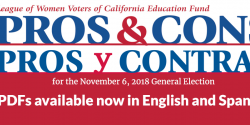Proposition 12: Establishes New Standards for Confinement of Certain Farm Animals; Bans Sale of Certain Non-Complying Products.
Should the State revise its current farm animal confinement laws with new confinement space standards for egg-laying hens, pregnant pigs, and calves raised for veal, and prohibit the sale of eggs and meat that do not comply with these standards, including those produced in other states?
In 2008 California voters approved a ballot initiative to ban the confinement of egg-laying hens, pregnant pigs, and calves raised for veal in a manner that did not allow them to “turn around freely, lie down, stand up, and fully extend their wings or limbs.” The law took effect in 2015, but problems arose, including complaints that the description of approved confinement space was too vague, and a lack of clarity about implementation and enforcement.
Proposition 12 would:
- By 2020, comply with the specific standard measurements set out in the proposition for cages of egg-laying hens, and calves raised for veal.
- By 2020, ban the sale of eggs and meat in which egg-laying hens, breeding pigs, and calves raised for veal are confined in areas smaller than a specific measurement by square feet, whether produced within California or originating in other states.
- By 2022, require that egg-laying hens in California be housed in cage-free housing systems, and that eggs from other states conform to California’s confinement standards in order to be sold in California.
- Designate the California Department of Food and Agriculture and the California Department of Public Health jointly responsible for the measure’s implementation.
- Potential decrease in state income tax revenues from farm businesses due to expenses incurred to meet the space requirements, likely not more than several million dollars annually costs up to $10 million annually to enforce the measure.
- State costs up to $10 million annually to enforce the measure.
- Consumer prices likely to increase for eggs, pork, and veal while farmers in California and other states change their housing systems to meet the measure.

